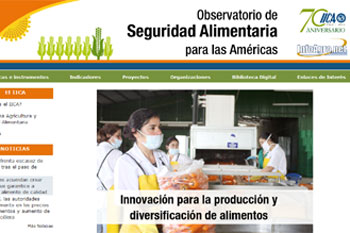This new site, which users can access free of charge, provides statistics, policies, programs, and other information related to food safety.

San José, Costa Rica, 9 November, 2012 (IICA). With the new Observatory of Food Security for the Americas, an initiative of the Inter-American Institute for Cooperation on Agriculture (IICA), only a click is needed in order to access information on this issue that is relevant to the hemisphere as well as to each country within the region.
The dynamic and bilingual monitoring and consultation site, available in both Spanish and English, will enable users to consult policies, instruments, indicators, projects, programs, and organizations related to food security in the Americas.
The observatory provides news and world events relating to this issue, as well as links that are of interest and a specialized digital library for consulting documents.
An innovation of the observatory is that, in addition to seeking information, the users can share reports or data that they consider relevant.
“We want the users to take advantage of the website and see it as theirs, more than as an IICA web page”, pointed out James French, Director of Technical Cooperation of the Institute.
French emphasized that the observatory responds to the need to provide the member countries of IICA with up-to-date, relevant and understandable information on food security.
“The current situation, in which high food prices, supply problens and economic crises converge, places food security at the center of national and international policies. But to make them effective, information is required, hence the need to have such an observatory”, said French.
Although similar observatories already exist, many focus on specific regions outside of the hemisphere or lack up-to-date information.
The observatory is expected to be a tool for ongoing consultation, available to decision-makers, academics, civil servants, students, the private sector, and all those interested in the food security issue. Access is unrestricted and free of charge.
For more information, contact:
james.french@iica.int
observatorio.seguridad.alimentaria@iica.int











